We may not have the course you’re looking for. If you enquire or give us a call on 01344203999 and speak to our training experts, we may still be able to help with your training requirements.
We ensure quality, budget-alignment, and timely delivery by our expert instructors.
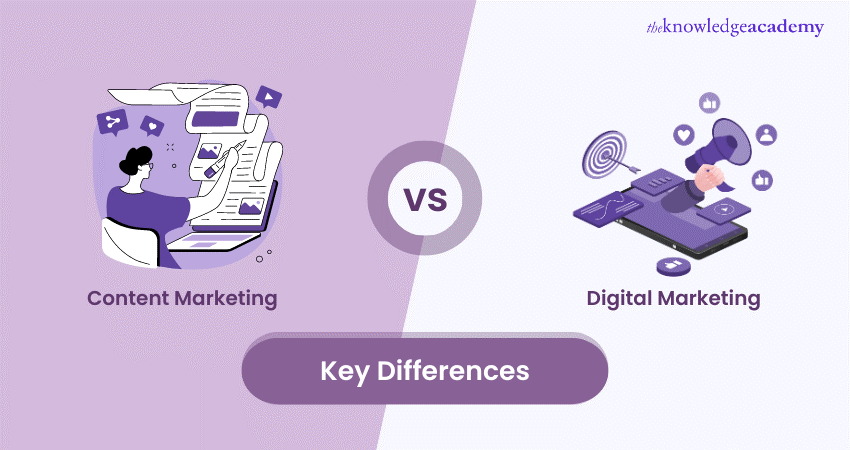
Being in the Marketing domain, professionals often get confused between the two approaches: Understanding Content Marketing vs Digital Marketing. While these techniques may seem to be similar, they have far-fetched differences that are crucial to understanding effective strategy development.
Content Marketing is a focused approach that revolves around creating, publishing, and distributing content to attract and engage a specific target audience. On the other hand, Digital Marketing is an umbrella term encompassing a more comprehensive range of online marketing tactics and strategies. Each serves a unique purpose and often works best when strategically aligned with other elements of Digital Marketing.
While this is the basic difference between these Marketing techniques, professionals engaged in the field must have a clear understanding of their differences to build a strong online presence. In this blog, you will learn the differences between Content Marketing vs Digital Marketing, along with their pros to help you choose which is better for your business.
Table of Contents
1) What is Content Marketing?
2) Pros of Content Marketing
3) What is Digital Marketing?
4) Pros of Digital Marketing
5) Key differences between Content Marketing and Digital Marketing
6) Conclusion
What is Content Marketing?
Content Marketing is a strategic approach focused on creating and distributing valuable, relevant, consistent content to attract and retain a clearly defined audience. It is responsible for driving profitable customer action. Unlike traditional marketing techniques that primarily focus on direct sales and advertising, it aims to establish a connection with the audience through informative, educational, or entertaining material.
This approach is relevant to driving potential customer engagement, building trust, and establishing the brand as an authority. Content can take various forms, including blog posts, videos, infographics, podcasts, and social media posts, each tailored to meet the interests and needs of the target audience.
By providing valuable and engaging content, businesses can aim to influence consumer behaviour over time. Thus, they can create a loyal customer base that sees the brand as a valuable source of information and solutions rather than just a provider of products or services.
Pros of Content Marketing
Content Marketing offers several advantages, making it an integral part of many businesses' marketing strategies based on different Types of Content Marketing that business' use. These advantages include the following:
a) Builds brand awareness and recognition: Regularly publishing quality content helps increase visibility and establishes your brand as a thought leader in your industry.
b) Enhances audience engagement: Engaging and relevant content encourages interaction from the audience, fostering a deeper connection with your brand.
c) Improves Search Engine Optimisation (`SEO) and online visibility: Content rich in keywords and value boosts search engine rankings, driving organic traffic to your website.
d) Generates leads and sales: High-quality content can attract potential customers and gently guide them through buying.
e) Supports other Digital Marketing strategies: Content Marketing complements digital strategies like SEO, social media marketing, and email campaigns, enhancing overall effectiveness.
f) Builds trust and credibility: Consistently providing valuable information establishes your brand as a trustworthy authority.
g) Cost-effective: Content Marketing often requires lower upfront investment and can provide a higher ROI over time than traditional marketing.
h) Long-term benefits: Quality content can continue to attract and engage audiences long after it’s published, offering enduring Benefits from Content Marketing.
i) Facilitates customer education: Informative content can educate customers about your products or services, helping them make informed decisions.
j) Encourages customer loyalty: By continuously providing value, Content Marketing nurtures loyalty, turning customers into brand advocates.
Do you want to learn about Search Engine Marketing? Sign up now for our Search Engine Marketing (SEM) Training!
What is Digital Marketing?
Digital Marketing refers to using digital channels, tools, and strategies to promote a brand, product, or service online. It encompasses various marketing activities conducted through electronic devices or the internet. This includes SEO, Content Marketing, Social Media Marketing, PPC, Affiliate Marketing, Email Marketing, Mobile Marketing, and much more.
Between Traditional Marketing and Digital Marketing, Digital Marketing aims to reach a target audience more effectively and efficiently than traditional marketing methods. It leverages data analytics and digital technologies to gain insights into customer behaviour, allowing for more personalised and targeted marketing efforts.
Enhance your knowledge of Digital Marketing with our Digital Marketing Courses. Join now!
Pros of Digital Marketing
Digital Marketing offers several advantages. These advantages include the following:
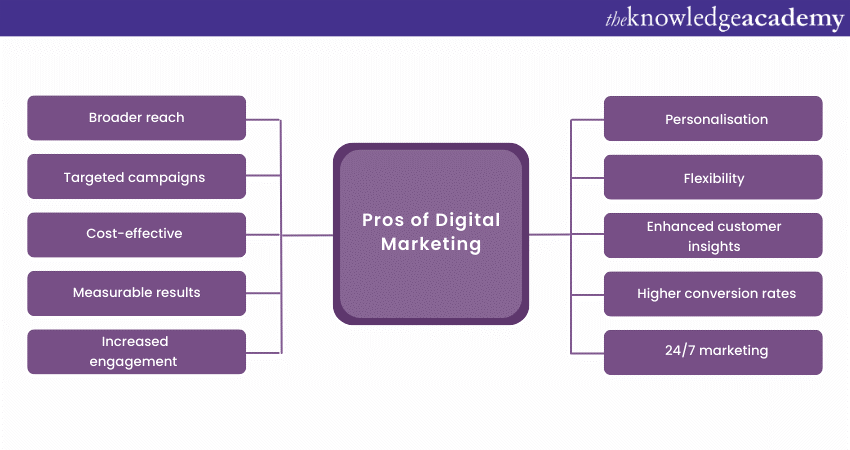
a) Broader reach: Access a global audience quickly and cost-effectively.
b) Targeted campaigns: Tailor marketing efforts to specific demographics, interests, and behaviours.
c) Cost-effective: Lower costs compared to traditional marketing methods.
d) Measurable results: Utilise analytics for real-time campaign tracking and adjustments.
e) Increased engagement: Engage customers through various digital platforms.
f) Personalisation: Personalise marketing messages based on customer data.
g) Flexibility: Quickly adapt strategies based on market trends or feedback.
h) Enhanced customer insights: Gain valuable insights into customer preferences and behaviours.
i) Higher conversion rates: Use targeted approaches to increase conversions.
j) 24/7 marketing: Reach customers at any time, without time constraints.
Are you interested in learning more about Content Marketing? Register now for our Content Marketing Course!
Key differences between Content Marketing and Digital Marketing
Now that you have a basic idea of Content Marketing and Digital Marketing let’s discuss their differences. Refer to the following to learn more about Content Marketing vs Digital Marketing:
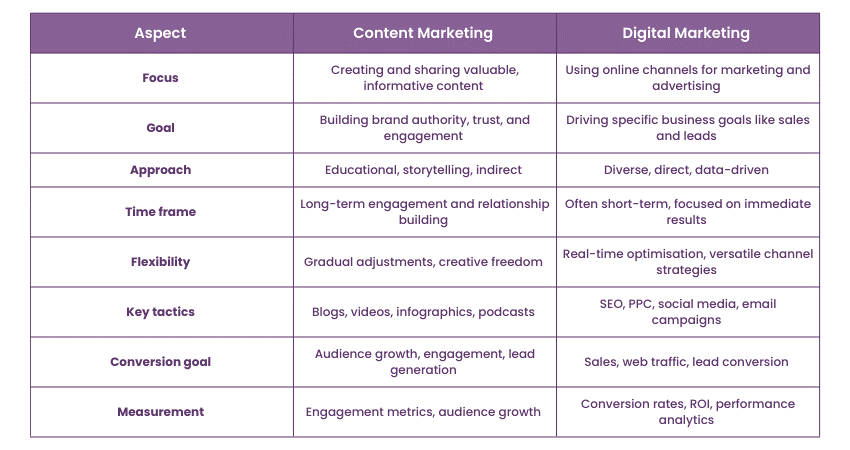
Varied conversion objectives
Content Marketing primarily aims to educate and inform the audience, establishing brand credibility and authority. The conversion objective here is often to nurture a long-term relationship with the audience. The key goal is to encourage interactions, such as likes, shares, comments, or time spent on a webpage, which are seen as preliminary steps towards building a loyal customer base.
It seeks to attract potential customers by providing valuable information. It aims to capture their contact information (like email addresses) for further nurturing through email campaigns or other follow-ups. By consistently delivering valuable content, the aim is to keep existing customers engaged and loyal to the brand, turning them into advocates over time.
On the other hand, Digital Marketing campaigns, especially those involving PPC, affiliate marketing, or direct advertising, often have immediate sales and revenue increase as their primary conversion objective. Strategies like SEO and PPC are designed to drive more website traffic, aiming to increase visibility and the potential for sales.
In Digital Marketing, the focus is not just on generating leads but also on converting these leads into customers. Tactics include targeted offers, retargeting ads, and personalised email marketing campaigns. While this is a common objective with Content Marketing, Digital Marketing seeks more immediate visibility through strategies like social media campaigns, online ads, and influencer collaborations.
Do you want to learn more about Email Marketing to improve your business? Register now for our Email Marketing Course!
Distinct time perspectives
Content Marketing builds relationships, trust, and credibility over time. The results, such as brand loyalty and authority, are typically realised gradually. The value of Content Marketing compounds over time. A piece of content created today can continue to attract and engage with users months or even years later, provided it remains relevant. Further, consistent creation and distribution of quality content are necessary. The impact grows as the content library expands, requiring ongoing effort and patience.
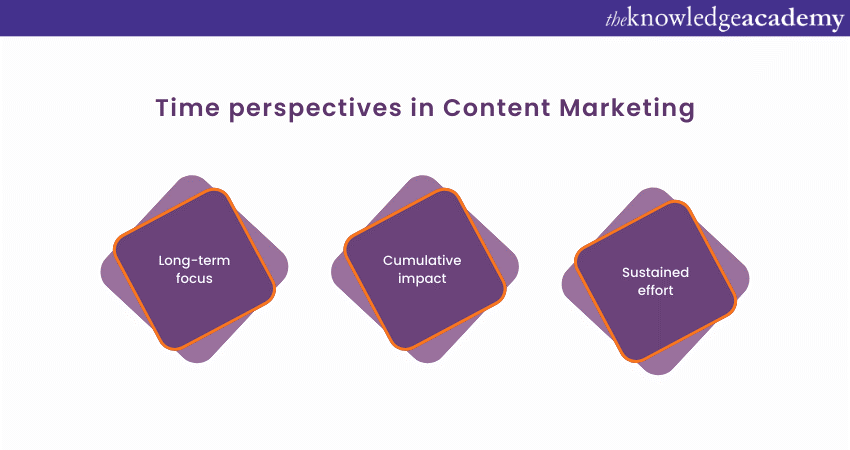
Meanwhile, many Digital Marketing strategies, like PPC or social media ads, aim to achieve quick results. Campaigns are often designed to elicit an immediate response, such as a click, a purchase, or a sign-up. Digital Marketing campaigns can be real-time adjusted based on performance data. This immediate feedback loop allows for quicker pivoting and optimisation compared to the slower pace of Content Marketing.
It often operates in discrete campaigns with specific start and end dates, aligning with product launches, sales, or other timely events. These campaigns are designed to achieve clear, time-bound objectives.
Improve your skills in Digital Marketing more with our Digital Marketing Masterclass now!
Type of approach
Content Marketing focuses on providing value to the audience through educational, informative, or entertaining content. It's about teaching, informing, or solving problems. This approach often involves storytelling to build a brand narrative. It's about creating a connection and emotional engagement with the audience through compelling and relatable content.
It typically employs a gentle sell approach. Instead of directly promoting products or services, it subtly integrates them into content primarily focused on delivering value to the audience. The primary goal is to attract and retain a clearly defined audience. Content Marketing seeks to grow this audience over time, establishing a loyal community around the brand.
On the contrary, Digital Marketing encompasses various strategies and channels, including email, social media, SEO, PPC, and more. It’s about leveraging multiple platforms to reach and engage the audience. It focuses more on achieving specific objectives, like generating leads, driving sales, or increasing web traffic. The call to action is more simple and conversion-focused.
This approach heavily relies on data and analytics to guide strategy. Campaigns are often designed and adjusted based on measurable metrics and audience insights. Moreover, It is more active and capable of quick changes and adaptations in response to market trends, consumer behaviour, or campaign performance data.
Do you want to learn social media strategies to reach out to larger audiences? Register now for our Social Media Marketing Course!
Flexibility
Flexibility in marketing reflects distinct differences in how Content and Digital Marketing adapt to changes, implement strategies, and respond to audience needs.
Content Marketing strategies often have a longer planning and execution cycle. Changes and adaptations in Content Marketing are usually more gradual, reflecting shifts in audience interests or market trends over time. It allows for a wide range of creative expression through various formats like blogs, videos, podcasts, and infographics. This diversity offers the flexibility to explore different storytelling techniques and content styles.
Content Marketing strategies can evolve as the audience grows and changes. This flexibility allows brands to deepen their relationship with their audience by aligning content with changing interests and preferences. While adaptable, it often maintains a consistent brand voice and style, ensuring a coherent brand narrative over time.
On the other hand, Digital Marketing campaigns can be adjusted quickly based on performance data, especially in channels like PPC or social media advertising. This flexibility allows for immediate response to audience behaviour or market trends. It involves multiple channels (SEO, email, social media), each offering flexibility. For instance, social media marketing can be quickly adapted, while SEO requires a more steady, long-term approach.
The ability to perform A/B testing in Digital Marketing campaigns provides flexibility in determining the most effective strategies, designs, or copy for a target audience. It allows for the flexible targeting of different audience segments with tailored messages. This can be adjusted frequently to improve campaign relevance and effectiveness. Here's how flexibility is helpful in Digital Marketing:
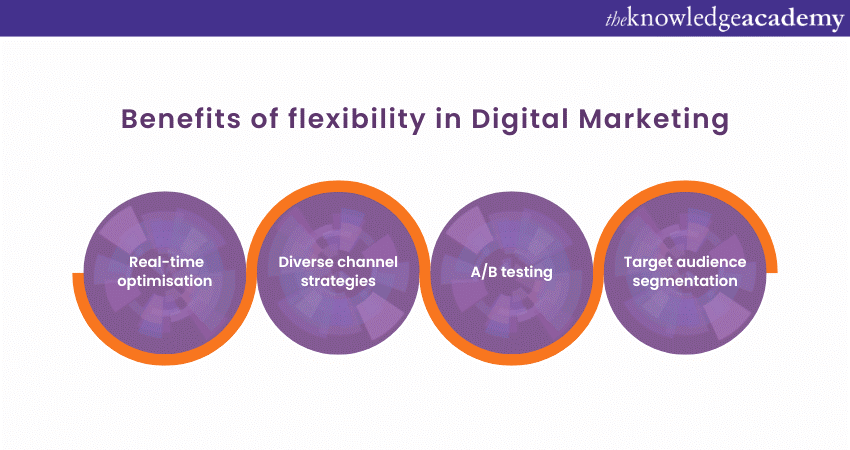
Learn how to improve your analytical skills to know more about your website traffic with our Google Analytics Certification Course!
Conclusion
In this blog, we discussed the differences between Content Marketing vs Digital Marketing. Even though both Types of Marketing are essential in businesses, some factors are necessary to determine the kind of marketing that will be beneficial for the organisations. While Content Marketing builds long-term relationships through valuable, informative content, Digital Marketing employs a broader, more immediate approach using various online channels for specific business goals.
Learn all new marketing strategies to improve your business operations with our Business Marketing Strategies Training!
Frequently Asked Questions
What are the Other Resources and Offers Provided by The Knowledge Academy?

The Knowledge Academy takes global learning to new heights, offering over 3,000 online courses across 490+ locations in 190+ countries. This expansive reach ensures accessibility and convenience for learners worldwide.
Alongside our diverse Online Course Catalogue, encompassing 19 major categories, we go the extra mile by providing a plethora of free educational Online Resources like News updates, Blogs, videos, webinars, and interview questions. Tailoring learning experiences further, professionals can maximise value with customisable Course Bundles of TKA.
Upcoming Digital Marketing Resources Batches & Dates
Date
 Content Marketing Course
Content Marketing Course
Fri 7th Mar 2025
Fri 2nd May 2025
Fri 4th Jul 2025
Fri 5th Sep 2025
Fri 7th Nov 2025






 Top Rated Course
Top Rated Course



 If you wish to make any changes to your course, please
If you wish to make any changes to your course, please


